“What should I do with my life?”
When it comes to the questions that keep us up at night, this one tops the list for many of us.
Its scope is a little terrifying, it's something we get asked about from the moment we can speak as children, and it can be pretty damn frustrating to answer!
If you're reading this, I assume that you haven't quite found that calling yet. The purpose or career that makes you wake up before your alarm, excited to get out there and take on the day.
Instead, you probably feel unsatisfied, alone, with a little dash of existential dread.
It's not an easy thing to be uncertain in today's world. We read all these articles about “following your passion” (which is bullshit, more on that later). We see friends who love their jobs and our families who constantly ask us if we're going to figure it out.
All you want is to find something that scratches the itch of satisfaction. To wake up and feel like you're doing something that makes you content — or at the very least, makes you feel like you're on the path to that eventual goal.
If that's you, you're in the right place!
This post is going to break down a highly actionable, step-by-step framework that you can use to finally figure out what you should do with your life.
It's not fluffy, it's not kumbaya, it's real advice that you can sink your teeth into that leads to real results. Here's what we're going to cover:
- My personal story from chaos to clarity in my own career (and how that will help you)
- The myth about “passion” and why it's actually keeping you from doing what you love
- A worksheet you can use to define your core values / priorities and translate them into real careers
- A strategy for going “behind the scenes” on different career paths and learning how to get started
- A 30 day framework you can use to “test drive” any new field without wasting time on the wrong path
But first, who am I to even talk about all of this? Why take advice from me?
Let me start by sharing a little bit more about my journey from a depressed, desperate new grad to a life and career I absolutely love.
From Chaos To Clarity: How I Figured Out What I Wanted To Do With My Life
Shortly after graduating from college, I realized I was completely lost.
I had spent the four years of my undergrad focused on friends and fun instead of on the future.
I stuck it out with a degree I hated because I didn't want to change or explore. I also didn't do any sort of career search whatsoever — I didn't apply to or interview for a single job. The one I landed was dropped into my lap by my roommate's Dad.
I graduated from college with a degree in biology, a 2.58 GPA, and a job in medical device sales. A job I'd end up hating because it paid next to nothing and my boss was a total jerk:

I was getting up at 3am every day to drive 2 hours to be at a hospital by 5am when surgeries started.
My salary was so low that my car payment and rent took up 90% of it and I was eating ramen noodles twice a day. Not to mention the $10,000+ in credit card debt I racked up just to get by.
I knew I had to make a change, but I had absolutely no idea what I wanted to do next.
It took me a hell of a lot of time, trials, and error to figure it out — but I eventually did. And man, did life get SO much better.
I ended up landing my dream job at Microsoft along with offers from Google and Twitter. I doubled my salary, was able to pay off my debt, and could finally afford things like a nice apartment and a vacation.
I also started my own business and I met my wife!
The goal of this post is to share the exact framework that I used to figure out what I wanted to do with my life.
I'm breaking it down so you can follow it and get clarity without having to waste time going down rabbit holes or trying stuff that doesn't work.
By the end of this post, you'll have a super clear idea of exactly what you need to do to figure out what you should do with your life.
Why The Current View On “Passion” Is Bulls**t And How It's Keeping You From Actually Figuring Out What You Want To Do In Life
How many times have you read an article about “finding your purpose” that told you to get out there and follow your passion.
I mean, duh! It was that easy this whole time! We're cured!
Then you try to go implement that advice and you realize that you have no idea idea what you're truly passionate about and that article gave you zero advice on how to figure that out.
It's like baking a cake for the first time with a recipe that says, “now stir in all the ingredients, bake at 350 for 25 minutes, and you're done!” We're missing a whole lot of important info there…
Here's the thing guys, “passion” is a highly misunderstood concept.
People think it's something that hits you like a lightening bolt in the middle of the night. You jolt awake suddenly knowing with supreme confidence that you were meant to create amazing user experiences!
Wrong.
That's not even close to how “passion” works in real life. It's nothing but a feel-good fairytale that's sold to people who are struggling with their purpose.
Here's the truth about “passion”:
Passion stems from action and action is the result of trying new things.
Nobody was born knowing that dipping your fries in a Wendy's frosty would taste amazing. Nobody came out of the womb knowing that (*controversial statement alert*) pineapple might just be the most amazing pizza topping.

Mmmm, you know you like it. Image courtesy of Wendy's.
Some crazy person had to actually take action and test it out!
They actually had to dunk that fry in that frosty while their friends and families looked on in horror.
When it comes to your career, you need to be that person! You need to do some research, follow your gut instinct, and take action.
That's the only way you're going to figure it out and we're about to dive into the the steps you can take to do that.
Step #1: Map Out Your Ideal Lifestyle
One of the biggest keys to happiness is making sure your work is aligned with your values and priorities.
I see this correlation across industries, roles, companies, countries, and levels of seniority. The happiest people are doing work that aligns with their specific priorities and values. The people who are unhappy with their situations have a disconnect.
If your #1 priority in life is making a ton of money, you don't really mind if you're not super passionate about a product or that you have to work longer hours as long as you're being compensated well.
But if your #1 priority is doing work that truly impacts the lives of others, a giant salary won't bring you happiness if your work isn't making an impact.
If your #1 priority is being able to make every soccer game and recital for your kids, an extra $20,000/year isn't going to be worthwhile if it means giving that up.
Prioritizing and defining your values is one of the best things you can do when you figuring out what you should do with your life.
If you're clear on one value being more important than another, you can use that as a litmus test for new opportunities that present themselves.
Reverse Engineering Your Career
Next, I want you to sit back, close your eyes, and take a deep breath.
Let go of any limitations — skills, experience, qualifications, connections — none of that matters. Now fast forward 5 years into the future.
You can do absolutely anything in the world. You could be a world famous fashion designer. You could be a Software Engineer II at Microsoft. You could be the SVP of Sales at a unicorn startup. Or you could be the founder and CEO of your own business!
If there were no limits or qualifications, what would you be doing?
Answering that question will help us define a destination. And it's okay to have multiple destinations! You can have 3, 5, or more if you'd like.
The important thing is giving yourself insight into the end of a few different paths. I always say that you should only take advice from people who already have what you want.
This allows us to define those people so we can reach out to them and reverse engineer the steps we need to take (more on that later on in the post).
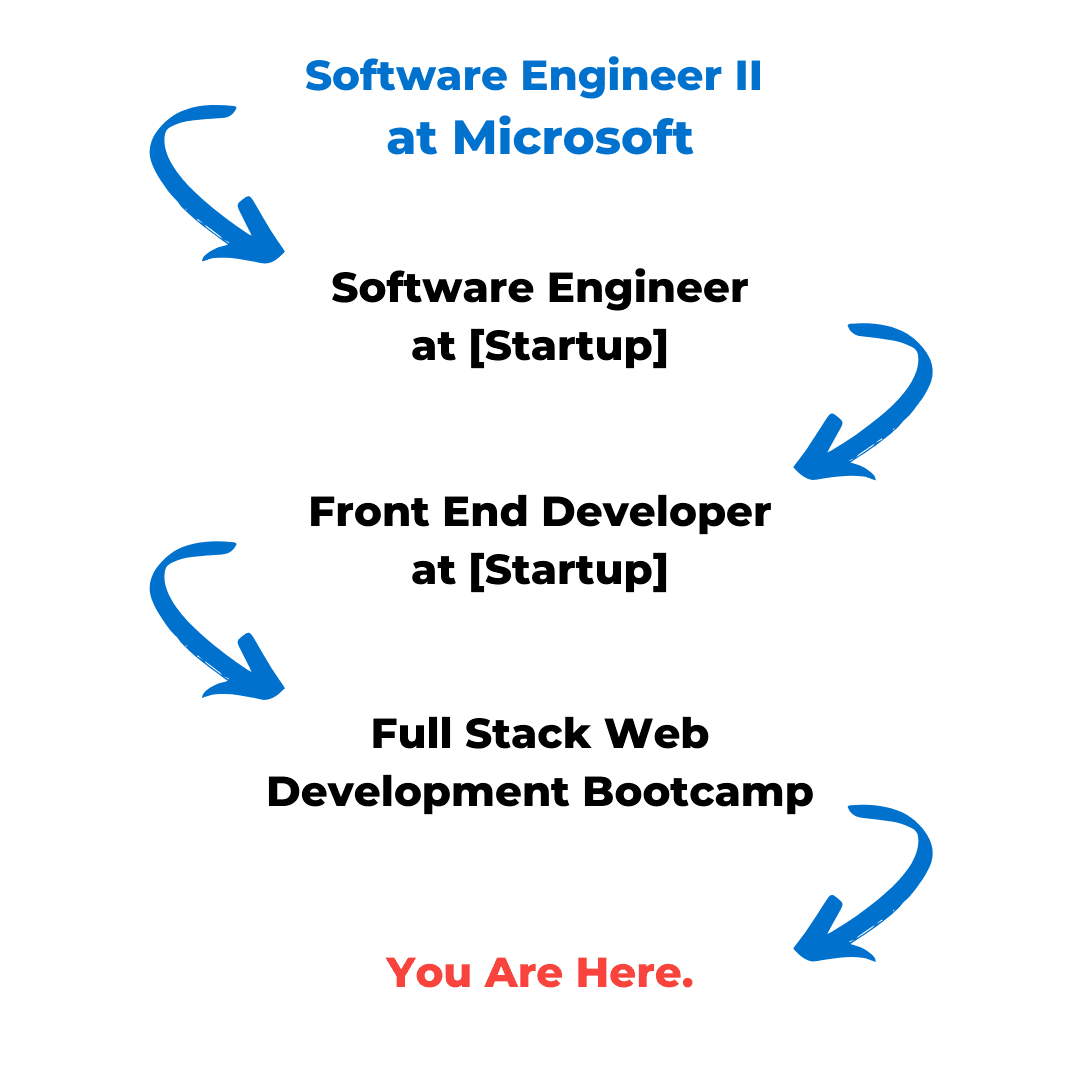
Label Your Activities: What Gives You Energy? What Takes It Away?
Next, let's take a look at your current setup and figure out what you enjoy doing and what you absolutely can't stand.
Whether you're a college student, barista, account manager, teacher, software engineer, construction worker, or politician, you perform activities every single day.
Reflecting on those activities will give you a better understanding of what you enjoy doing vs. what totally saps your energy.
For example, a college student may love classes where they get to build real things. They hate the classes that focus on pondering abstract and undefined concepts. That's indicative of them being interested in a career that allows them to build real, tangible things!
Or maybe our barista loves to spend extra time making insanely creative latte art, but hates the paperwork that has to get done during closing. That's indicative that creativity is something they love, while administrative details aren't really their thing.
By labeling these activities, we can take a step back and compare them to the activities associated with potential jobs and opportunities to see if that new role would bring you energy or totally sap it!
Fill Out My Lifestyle Mapping Worksheet
In order to help you distill your thoughts here, I created a Lifestyle Mapping worksheet.
It's short, it's simple, and it's going to be your guide as you progress through the steps in the rest of this article. It's something you can come back to as a central point of reference when you're exploring new paths and opportunities.
You can download a copy for free (no email required) by clicking this link, here's what it looks like:
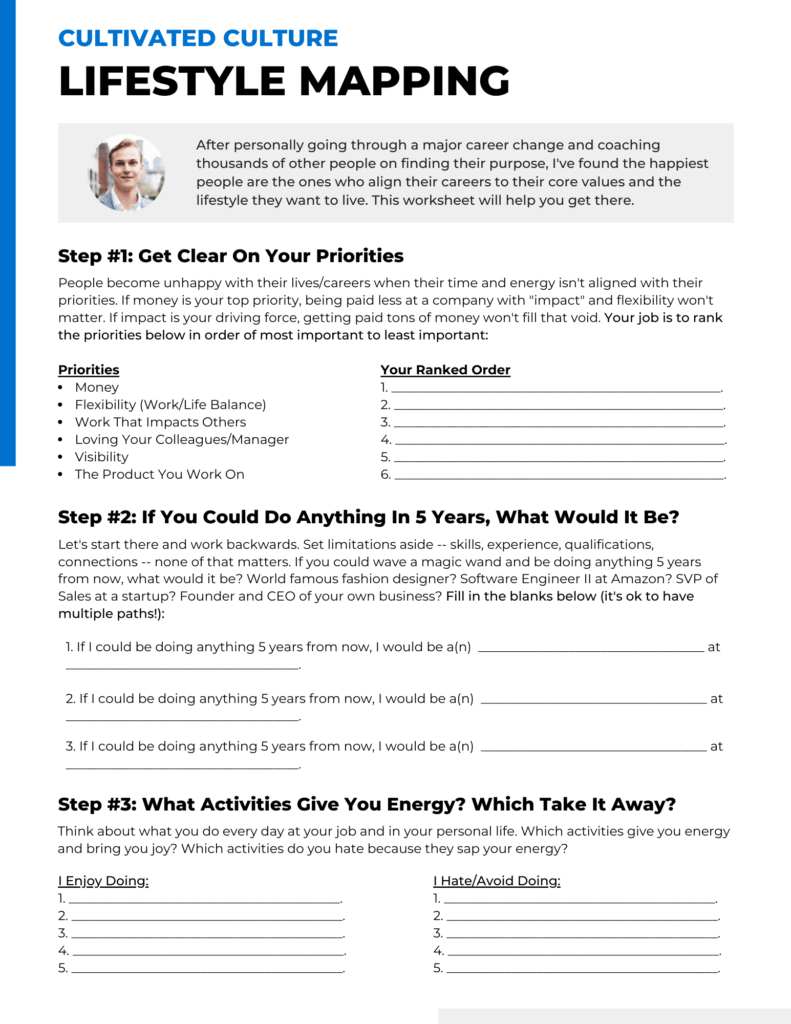
Awesome! Now you have a foundation that you can build off of as we dive deeper into the steps you can take to figure out what you want to do with your life.
Step #2: Get Clear On Your Core Values & Strengths
Similar to the priorities mentioned above, defining and understanding our values is another key to figuring out our purpose.
Here's the thing — for much of our life, we're taught to focus on improving our weaknesses.
You got a D in that class, so spend more time studying the subject. You're not a very outwardly emotional person, so take this course on learning to be more expressive. You're falling short on these technical skills so work on beefing them up.
I'm all for personal growth and improvement, and shoring up weaknesses is a part of that. But life, happiness, and success come so much more easily when we focus on our strengths.
Michael Jordan spent thousands and thousands of hours on the basketball court honing his skills. He knew he had a natural talent for basketball and he invested in it.
What would have happened if he applied those same hours to astrophysics? Would have been good? Sure, maybe. Would he have been the best to ever exist in the field? Probably not.
Jordan got to #1 because he created compound interest by investing in an area where he knew he was naturally talented.
On the flip side, Bill Gates spent thousands of hours creating software that revolutionized the world.
What would have happened if he spent that same time working on becoming a basketball player? Would he have been any good? Probably not.
Would he have been one of the greatest to ever do it? Lol.
Tom Rath, the author of StrengthsFinder, distilled this concept into something he calls The Strength Equation. It goes a little something like this:
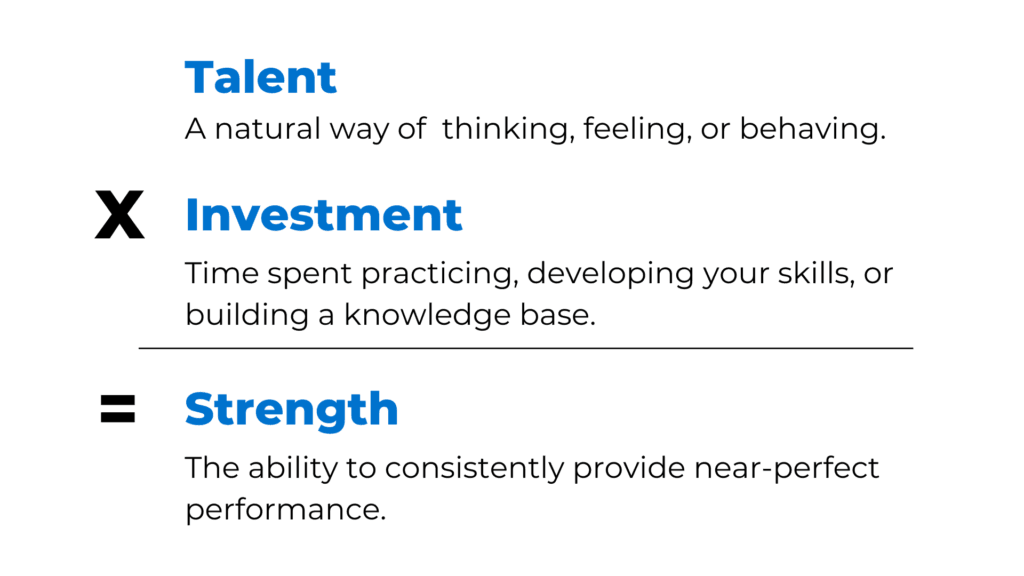
Hard work and investment is huge, no doubt about it. But your gains are going to be multiplied if you combine that work with an innate talent or skill you possess.
And if you want to invest in your strengths, you have to know what they are!
Take A Quiz, Identify Your Values (You Won't Believe #3!)
No, I'm not talking about which Disney prince/princess you were meant to end up with (sorry).
I'm talking about an assessment our buddy Tom Rath put together called StrengthsFinder.
StrengthsFinder is a massive quiz where you're given two statements like “I want everyone to like me” and “I want everyone to adore me” and you have to choose which one strongly represents you on a scale.
You'll doubt yourself and crack jokes about how weird the questions are…and then you'll get your “answers” in the form of your top 5 strengths/values and you'll be blown away by the accuracy.
Here are mine:
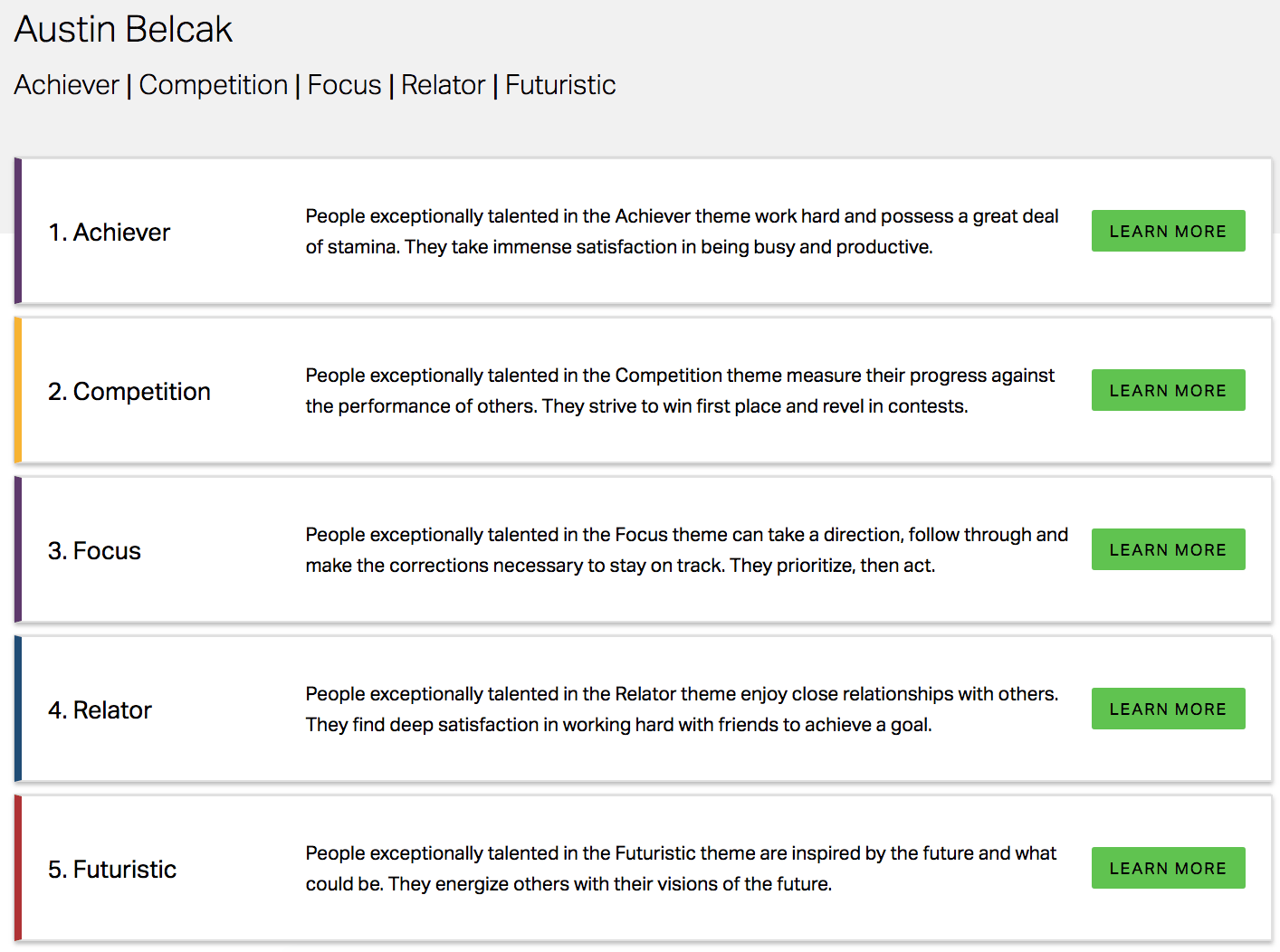
Now, I'm very skeptical of online quizzes and assessments because they typically give you a lot of fluffy information that in no way helps you take action or solve any of your problems.
StrengthsFinder is different.
Not only do you get your five strengths, but StrengthsFinder goes in detail about what each means and how it relates to you.
Then it spits out a seven page report on how each of your five unique strengths combine to make up the person you are today — including your tendencies, goals, ideas, and behaviors.
I was blown away by the results because they hit the nail on the head with about 99% accuracy. I think I disagreed with two sentences in the entire, auto-generated document.
That's pretty impressive. If you're interested, I've uploaded my full StrengthsFinder report for your viewing pleasure, you can read it right here.
The easiest way to get started with StrengthsFinder is by grabbing a copy of the book on Amazon and leveraging the access code that comes with it to take the online assessment.
If StrengthsFinder isn't in your budget, you can check out High5's Free Strengths Test which is a free alternative.
Use Career Explorer To Find Out How Your Values Equate To Careers
Now that you know what your strengths are, the next step is to see which careers will allow you to leverage them to the max!
Career Explorer will help you do just that.
I have no affiliation with these guys, they just have one of the most comprehensive career quizzes I've seen to date (and I've seen a lot!).
First, you start with a section on your Personality Archetype where you'll be asked about different activities and rate how much you'd enjoy doing them.
Career Explorer will use that to give you a specific Personality Archetype with a full breakdown.
Next, the quiz will serve up careers that might match your archetype. Your job is to rate how much you'd like to do them on a scale of 1-5.
When you're done with this section, Career Explorer will serve up a few initial matches for you — but you can refine them by submitting more info.
In the next section, the quiz will ask you about your background — education, work history, where you live, and what your compensation looks like.
Finally, the quiz will ask you a series of questions about what you enjoy about specific roles and what you'd like to avoid. For example:
- Your work environment fosters a culture of competition
- You're responsible for managing others
- You work independently / alone
- Your work has a real impact on people's lives
- You spend most of your days working outdoors
- You have an unpredictable work schedule
When you're done here, Career Explorer will spit out some career matches for you as well as a Personality and Trait report to help you make sense of your answers.
These matches paired with your Lifestyle Mapping worksheet are a great jumping off point for our next step.
Step #3: Learn From People Who Have Already Figured Out Their Life
At this point, the pre-work is done.
You may not be clear on the exact title that matches your purpose, but at least you have some core values, priorities, and a general direction to reference.
Our next step is to get out there and find people who are already living those values and use them to create a roadmap.
Only Take Advice From People Who Already Have What You Want
When I was struggling with my job search, I sought out the same people most of us look to when we need help: family, friends, and Google.
The problem was, most of these people didn't understand what I was struggling with and they hadn't been where I wanted to go.
Sure, they were successful in their own rights but they hadn't had to do a soul searching expedition to figure out what they wanted and they certainly hadn't tried to get in the door at Microsoft or Google with a biology degree and 3 months of professional experience.
One of the best pieces of advice I've ever received was to “only take advice from people who already have what you want.”
After hearing that, I went and wrote out the criteria for my dream job:
- To be working at a world leading tech company
- To be living in a city like New York or LA
- To be making six figures annually
- To be under the age of 26 when it all happened
Then I went out and found people who matched those criteria, with a specific focus on those who came from a non-traditional background (like me!).
I want you to do the same thing.
Step #2 of your Lifestyle Mapping worksheet is a great place to start. Who is already working in the position that you set your sights on in 5 years? Who is there and came from a background that's similar to yours?
Alternatively, who is simply doing cool stuff right now?
Maybe artificial intelligence has become a bit of an obsession, go find people who are working in that field!
Maybe your goal is to become a travel photographer for a place like National Geographic. Go find photographers who work there now!
Using LinkedIn To Find Your People
You can easily do this by using LinkedIn.
All you need to do is fire up the platform and search for your target job title. Then you can use the filters to narrow things down by company, geography, alma mater, etc.
For example, let's say I was looking for Marketers who work at streaming companies in New York.
I'd show up on LinkedIn and type “Marketing” into the search bar.
Next, I'd use the Companies filter to select companies like Spotify, Pandora, SoundCloud, HypeM, and Tidal. Finally, I'd select Greater New York City Area under Location:
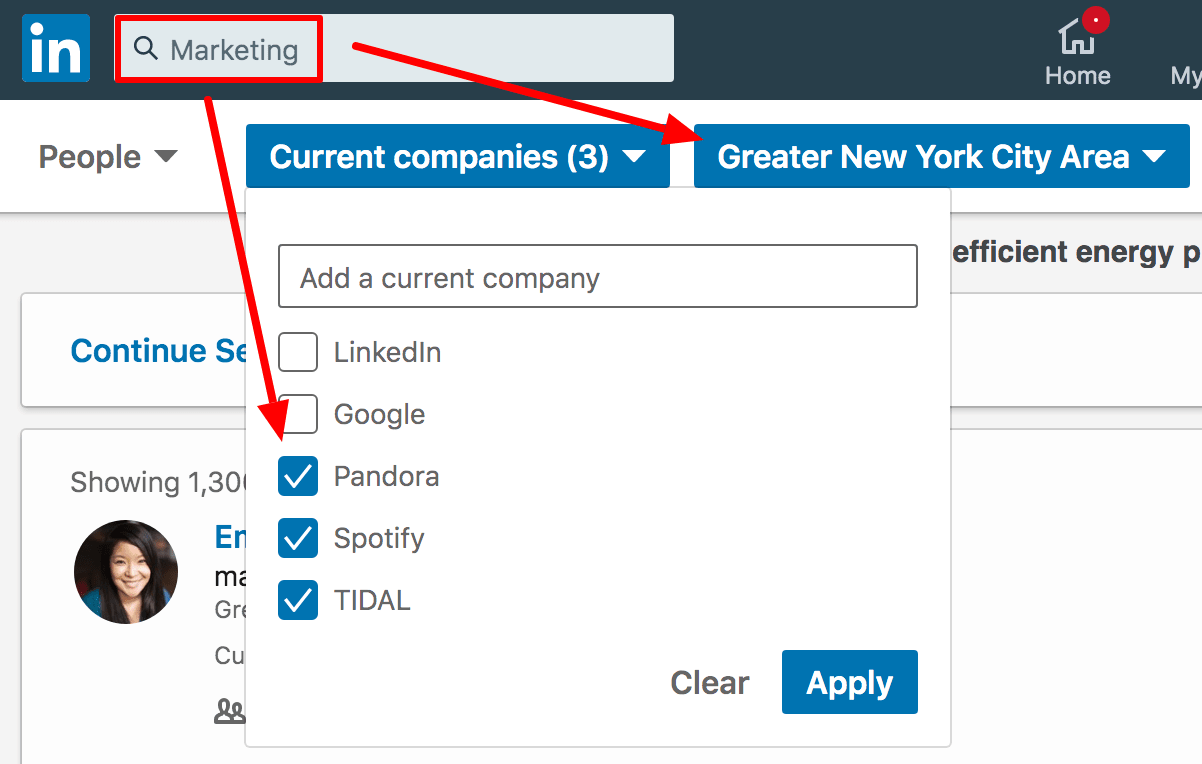
When you hit Apply, LinkedIn is going to serve up a list of people who meet most of the criteria we laid out before. They're already doing what you're interested in!
We can use this as our own personal rolodex to have conversations with people who actively work in these roles to learn more and see what's right for us.
Pro Tip
Maya Grossman, a Product Marketing Adviser at Google, has a fantastic career roadmap toolkit with specific strategies for performing outreach in order to figure out what you want. She's compiled it all into a Google Doc that anyone can access, you can read it here.
Creating Your Personal Rolodex
After you run your search on LinkedIn, you want to begin saving the names of people that you want to reach out to.
I personally recommend finding at least 30 people to add to your rolodex:
![]()
I personally used a Google sheet with the following criteria (here's a link to a pre-made Google Sheet if you'd like):
- Full Name
- Job Title
- Company
- Email Address
- LinkedIn Profile Link
- Notes
I would click into each result that LinkedIn surfaced and I would scan that person's profile. I was looking for people who would be able to give me the best info.
Note: Every contact is not created equal. If you don't have a traditional background and you're trying to get into a new industry or an industry you don't have any experience in, be careful!
People with traditional backgrounds may not be the best to reach out to. They went to school for this and/or they've been in the industry for a long time. They didn't have to overcome to objections you're facing right now.
Are they worth talking to? For sure! But following our mantra of taking advice of people who have been where we want to go, you may get more actionable information from someone who broke into this field from a non-traditional background.
If you're wondering how I found people's email addresses, it's super easy.
I used a tool called Mailscoop.io which is free and lets you search for anyone's email by dropping in their full name and a link to their company:
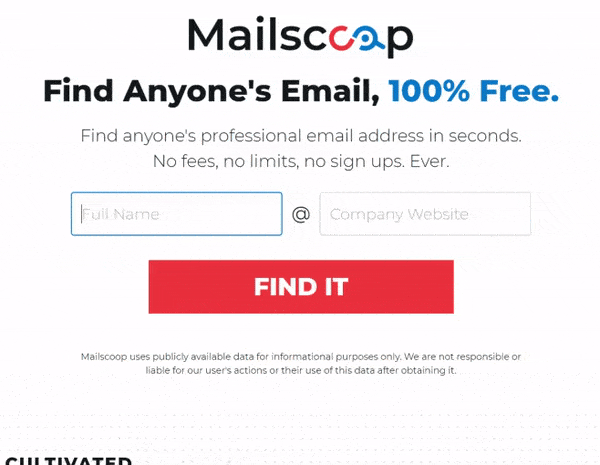
I personally recommend reaching out via email when you can and only using LinkedIn as a backup.
The response rates on email are much better and it's a heck of a lot cheaper than sending InMails!
What Do You Even Say In This Email? Steal This Template.
One of the biggest hurdles in this process is figuring out what the heck you should be saying to these people when you email them.
After all, they're complete strangers, right? Why would they talk to you?
Here's the thing — people want to help. Especially people who have made a career change or couldn't figure out what they wanted to do with their own life.
The best things you can do are:
- Be honest about your situation
- Find a way to build them up and recognize them for their accomplishments
If you tell them their experience is impressive and you want to learn more from them, that's a powerful statement!
You don't have to come up with something from scratch either. Here's the exact email I used when I was going through this process:
Austin's Email Template
Subject: Quick Question
Hi [Name],
My name is [Your Name] and I came across your information on LinkedIn while I was looking for people who transitioned into [Industry/Role] from a non-traditional background. Your background is really impressive!
I'm exploring different fields and [Industry/Role] really piqued my interest. If you have few minutes, I'd love to hear more about your journey and what you do in your role today.
I know that's a big ask so no worries if it's too much. I totally understand. Either way, I hope you have a great rest of the week!
Best,
[Your Name]
Now you just need to fill in the blanks and hit send!
You can expect a response rate of about 15-20% when you're starting out. This is why I recommended finding at least 30 contacts, but the more people you reach out to, the better your chances of finding people who are up to chat.
Don't be afraid to follow up either — 3 business days is a good rule of thumb. If you don't hear from someone after 3 business days, shoot them a follow up.
If you still don't hear from them after three or four follow ups, you can drop them and move on to the next person.
How To Have The Right Conversation (And Get The Info You Need)
As you begin to send emails, people will begin to reply and offer their guidance (I promise!).
These conversations can be a little nerve wracking at first, but growth happens outside of your comfort zone. The easiest way to get better and be more comfortable in these conversations is to have more of them.
While we want them to be casual, we do have an agenda for these conversations. Let's start by avoiding a major mistake I see a lot of people make:
Show Up And Set The Direction
It happens all the time.
Somebody like you closes their eyes and takes the leap by pressing send on that cold email. A few days later, someone replies! Turns out, they'd love to help you.
Then, when the conversation starts, the person in your shoes fumbles a bit and leaves their contact with the responsibility of picking up the slack and carrying the conversation.
Not great!
This person has already offered up their valuable time, we want to make them feel like it's worthwhile. We don't want them doing all of the work.
The best way to combat this is by setting a direction at the very beginning of the tone. All you need to do is restate the reason you reached out to them:
Set The Tone By Restating The Ask From Your Email
“I really appreciate you taking the time to chat with me today. As I mentioned, I found your information while I was looking for people who broke into [Job/Industry] from a non-traditional background.
That's super impressive and I've been excited to hear more about the entire journey. If you don't mind, maybe we can start at the beginning. What made you decide to take the leap from [Old Industry/Job] to [New Industry/Job].”
That gives your contact a clear direction to run with. Even better, that direction gets them talking about themselves!
That's good news for you because a recent study from Harvard showed that the pleasure centers in our brain light up when we talk about ourselves — the same pleasure centers that light up when we're eating an amazing meal or having sex.
Your Two-Part Agenda: Learn About The Role & How To Position Yourself
Once the conversation gets rolling, you can dive into the meat of things. Like I said, we have an agenda and it consists of two parts:
- Learning as much as we can about the specific role / field this person is in
- Getting actionable advice we can use to test drive the field for ourselves
When you're starting out, preparation is key. I liked to have a set of questions written down in front of me so that I wouldn't forget anything and I could figure out where to weave them into the conversation.
Here are the exact questions I asked to cover both of those goals:
Questions To Learn More About The Role
- What's the most interesting project you've worked on in the last year?
- What's your favorite part about working in [Field/Role]?
- If you could change one thing about your job, what would it be?
- Would you say that most people with your title do similar types of work? How do roles and responsibilities differ across companies and industries?
Questions To Get Actionable Advice
- Let's say you had to start your career from scratch today and you had to prioritize 2-3 things (courses, certifications, projects, etc.). What would those be?
- If I could do one thing over the next 30 days to make myself a better [Field/Role – e.g. Marketer] what would that be?
- If you could avoid one mistake you made during your journey to [Current Role], what would it be?
Those questions should give you all of the info you need to get started! Now your mission is to roll up your sleeves and actually go put their advice into practice using something I like to call Mini Pilots.
Step #4: Use 30 Day “Mini Pilots” To Field Test Your Potential New Path
After you've had some conversations and gotten clear on a few paths that spark some interest, it's time to dive deeper.
People tend to hold themselves back from taking action because they're worried about “wasting time.” They don't want to invest in the wrong thing and have all that effort be for nothing.
This is a bit of a Catch-22 though because you'll never truly understand what you want to do if you don't give it a shot.
Out solution is a compromise – a deal you make with yourself, a Mini Pilot.
You're going to dive into this new field with full force for 30 days. You're going to give it your all – taking courses, reading books, getting certified, or even starting a project.
If you're still loving it at the 30 day mark, keep going! But if not, you have permission to quit. You can drop it like it's hot and move on to the next interest on your list.
By giving yourself an end date and permission to quit, you remove the pressure of investment. The worst thing that happens is 30 days of lost time! But you'll still get to carry that 30 days of experience with you, which will be more valuable than you think.
A Personal “Mini Pilot” Example: A Music Blog Called “The Soundrop”
It was junior year in college and I was still a biology major with plans to go into the healthcare field. I was also BIG into music.
This was 2012, right around the time when independent music blogs were really gaining traction. Sites like Fresh New Tracks, Dancing Astronaut, etc. were founded and blowing up the internet. Those sites were the places I went to to find new music.
Eventually, I thought, “if these people can get paid to write about music, why can't I?”
I had zero idea of how to start a website, how to write a blog post, how to market anything. I just had an idea, so I got started.
I I signed up with WordPress's free blog platform and created thesoundrop.wordpress(.)com. The full site was taken down a long time ago but you can check out a cached version here on Archive.org, check out that design (!!):
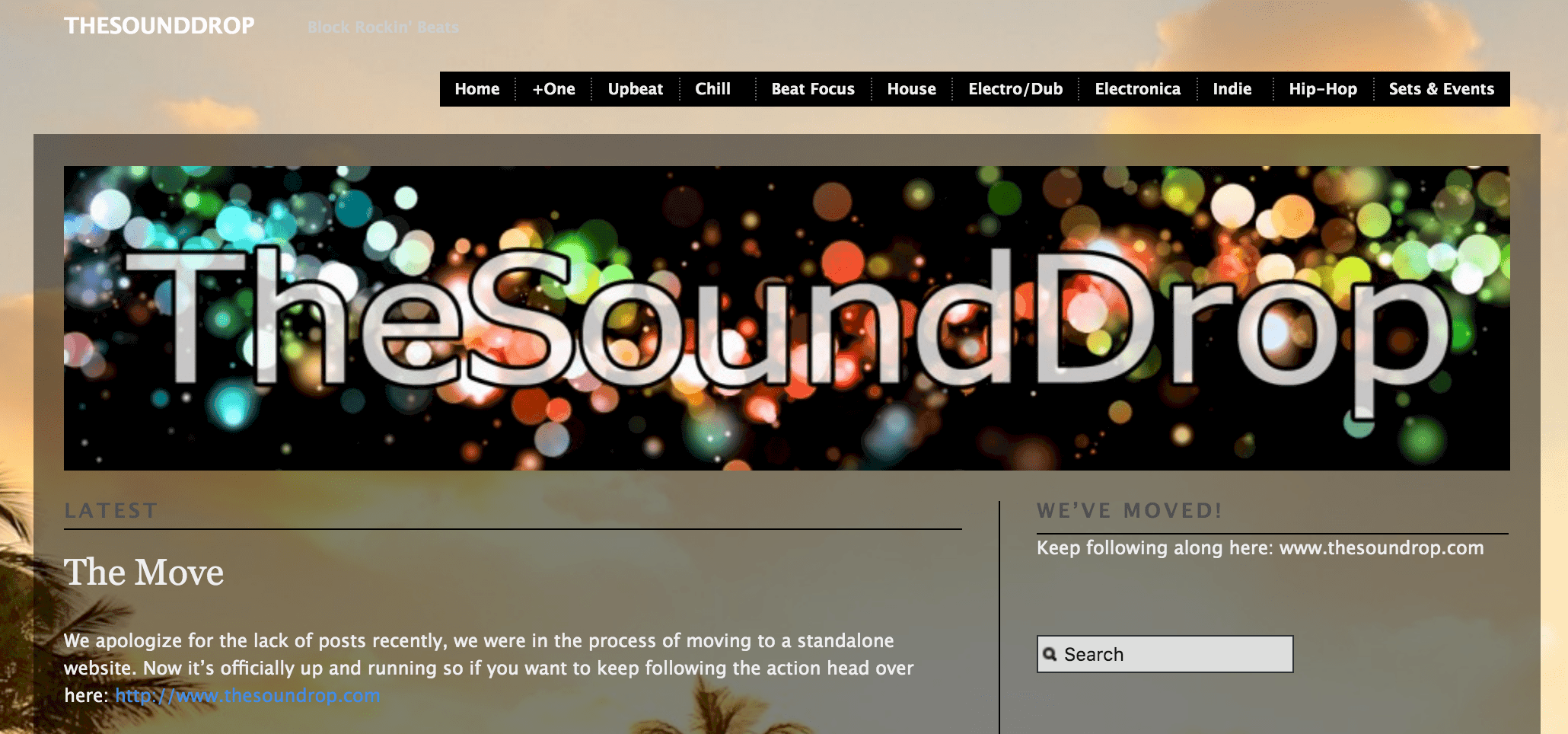 I spent the next few weeks devouring YouTube videos about how to set up a website on WordPress, how to design a logo, how to write and share posts, how to embed SoundCloud clips and YouTube videos, etc.
I spent the next few weeks devouring YouTube videos about how to set up a website on WordPress, how to design a logo, how to write and share posts, how to embed SoundCloud clips and YouTube videos, etc.
Then I began to create content. I would listen to a TON of new music every week and I would pick my top 5-7 songs to write posts about. Rinse and repeat for the next few months.
My site was getting ZERO visits but I absolutely loved it, it was a creative outlet. I actually kept it up for about 2 years total.
But was it a waste?
Metrics-wise, for sure. By the end of the run, I think we topped out at a total of 1,000 visitors. There wasn't much there (although the Chainsmokers manager reached out to me to share their new tracks back when they got started, which is pretty cool).
I had no audience and nothing else to show for it, but…
The next year, I started dabbling in digital marketing and when I needed to set up a test site or offer to create a site for a client — I already knew how to do it.
And if a client's site was having technical issues, I knew how to go into the back end to fix them.
And, finally, when I had the idea for Cultivated Culture, I didn't need to pay anyone to get started. I built the whole site myself!
My music blog Mini Pilot was my gateway into the digital world and it was a critical piece of my ability to break into digital marketing. Without the base of knowledge from this project, I would have been totally lost (or years behind at best) in the digital world.
More Examples of Mini-Pilots
The best Mini Pilots are real projects that allow you to get a sense of the projects you'd work on if you were in this field.
For example, if you:
- Wanted to be a Software Engineer, you could build a tool or an app
- Wanted to be a Social Media Manager, you could start an Instagram page and work to grow the following
- Wanted to be a Copywriter, you could get out there and start running through headline exercises and creating your own examples for existing products
- Wanted to be an Accountant, you could offer to do taxes for other people
Here are a few more Mini Pilot examples from other people who were working to figure out what they should do with their life:
Rahul Used “Mini-Pilots” To Find His Calling In Product Management And Land A Job At Facebook
In 2016, Rahul Iyer was working as a consultant and it just wasn't scratching the itch. He knew he had to get out and he was considering all sorts of options — coding bootcamps, project management, etc. but he wasn't sure what was for him.
Rather than get bogged down in analysis, he took the advice from a few friends to “just get started.”
First, he pitched a friend of his who had just began executing on the idea for his new company called Qoins.io. Rahul said he could help out with growth and retention.
According to Rahul, Qoins let him “‘consult and be on a contract' as a Product Manager for them. [He'd] work for free, and they’d pay for [his] parking.”
Rahul helped Qoins redesign their site and launch an iOS app, which led to a 10% decrease in bounce rate, and a ~31% increase in total signups.
A few months later, Rahul got in touch with his buddy Kevin who submitted his idea for a dating app on Amazon's Alexa to a group called Voicecamp. His application to Voicecamp was due in just about 24 hours and he needed help — Rahul said yes!
In Rahul's words, “we stayed up late that night and cranked out an Alexa dating app…It was pretty much a really crappy, highly NON-functional prototype — for which we shot a lame homemade video to go along with it.”
A few months later they got a call from Voicecamp — their application had been accepted.
Eventually Rahul went on to land a job as a Product Manager at Facebook. He figured out his called by keeping an open mind and proactively teasing out opportunities for Mini Pilots where he could get his hands dirty and build real experience in the Product Management field!
You can read about his entire journey from consulting to Facebook right here.
Joseph Found His Calling In Blockchain Through Mini-Pilots & Writing
In 2007, Joseph Bradley graduated from the University of Tennessee with degrees in Microbiology and Political Science. When the economy crashed in 2008, the only job he could find was in oil sales. While he was good at it, it was far from fulfilling.
So Joseph took a leap in the other direction and started his own venture — an experiential marketing company called Pedaler’s Society. A few months later, the business was on the rocks. Joseph decided to pull out after a check bounced for their last $350.
Looking for some stability and a chance to reset, Joseph enrolled in USC's Marshall School of Business where he started exploring new career options.
He landed internships at some of the best banks on Wall Street, but he also heard about this thing called Bitcoin that piqued his interest. Joseph made a commitment to himself — he was going to start writing articles about Bitcoin so he could fully understand the space and make the best decision for his career.
Joseph dove headfirst into the world of blockchain and began writing (on top of his current courseload and internships). He started with a few articles and, after realizing he loved it, he challenged himself to write 75 total posts. His work got picked up by Coindesk and other Cryptocurrency News outlets.
When graduation rolled around and Joseph had to make a career choice, he was faced with accepted an offer from a prestigious Wall Street firm or continue diving into blockchain.
He chose the latter and went on to spend 3+ years in the space along with founding several of his own blockchain companies and funds.
You can read about his entire journey from microbiology, to finance, to blockchain right here.
Jeff Started His Own Project Called Month 2 Master
Back in 2017, Jeff (a member of the Cultivated Culture audience) decided to start up a project called Month 2 Master.
His goal? To learn and master 12 skills in 12 months.
He covered a huge range of topics from overcoming rejection, to learning a language, to digital music production, to fitness. The coolest part of his project is the fact that he breaks down each skill and each month.
First, we writes up an initial post outlining his approach and his goals for the month. Next, he keeps a daily log for all 30 days so you can follow along with his progress – the wins, the rejections, the failures, the setbacks. Finally, at the end of the month, he writes up a post outlining how everything went.
I wanted to share this as a model for how you should be approaching your Mini Pilots:
- On Day 1, set a tough-but-reachable goal for yourself along with a plan to get there
- On Days 2-30, track your progress and monitor what's working, what isn't, what you like, and what you don't
- On Day 30, reflect on everything that's happened and see if you want to keep going
These are just three examples of people who used Mini Pilots to get unstuck in their careers and find what they truly wanted to do.
Key Takeaways On Figuring Out What You Should Do With Your Life
Whew, you made it!
That was a LOT of info, I know. But I hope you feel like you're armed with a few actionable steps you can take to get some clarity around your purpose.
Here's a quick recap of the overarching process of answering the question of, “what should I do with my life?”:
- Map out your ideal lifestyle – what does a day in the life of happy, purpose-driven you look like?
- Get clear on your values and strengths – use them as a barometer for new ideas as you're getting started
- Find people who already have what you want and learn from them
- Take action! Get out there and start up a Mini Pilot, see what it's really like to dive into this field with a real project
- Assess things at the 30 day mark – if you love it, keep going! If not, give yourself permission to quit and start on the next interest
If you follow that framework, you're not just going to figure out what you want to do with your life but you're also going to build some amazing new skills along the way.
Still Have Questions About Figuring Out What To Do With Your Life?
That's normal! Everyone's situation is different – we all have our own strengths, fears, and goals.
If you're comfortable, feel free to drop a comment below and share your thoughts. I read and reply to every single one!




































Very insightful Austin, read every bit of it! I really like the idea of a 30 day “Mini- Pilots”.
Thanks so much for taking the time to read it Alif! Mini Pilots are such a powerful tool for figuring out what you want without investing too much or wasting time. Glad you liked it!
Have you heard of the Internet Archive (archive.org)? It’s a favorite among genealogists and researchers for accessing resources that have disappeared into the ether. Sites like old music blogs…
https://web.archive.org/web/20180802064948/https://thesounddrop.wordpress.com/
(You’re welcome. 😉 )
Marissa, you are amazing! I didn’t even think to check Archive.org, thank you so much. It’s really funny to see the actual site again — we’ve come a long way 🙂
This is fantastic Austin! Thank you so much for taking the time to write this
You are so welcome Ileana, I’m glad it was helpful!
Thank you so much for a fantastic article.
” I had spent the four years of my undergrad focused on friends and fun instead of on the future” in the previous statement you’ve mentioned; I typically found my self in a similar situation. I graduated in 2016, until today, I’m looking for an ideal opportunity to spend what I’ve learned and some experience. So such an article like this you don’t know how it helps other people and me. But if you make it a little shorter, It’ll be more brilliant.
Appreciation
You’re so welcome Mazin, thanks for reading! May I ask why you’d like it to be shorter? If you had to remove a section, which one would it be?
Hey man,
your posts are so amazing. Thanks for this super great content. You delivery massive value. Adore you for this skill!
I’d like to start my own blog/online biz soon – can’t really wait – does anyone has a good idea of good how to courses for starting a blog/website from scratch? Also, what’s a good resource for building my own online course? Thanks so much!
Awesome Andy, you made my day! I’m super happy to hear it’s been valuable. I wholeheartedly recommend my friend Ryan Robinson for that. He has an awesome post on how to start a blog in 2020 that will be a great jumping off point for you.
Super helpful article, Austin! You took a ton of material and boiled it down in easy-to-digest bits. I’ve worked with a life coach for 3 months before, and feel like this article blends that work with logical, practical steps in one FREE article/resource. Kudos to you!
That’s high praise Kara, you made my day! I’m super happy to hear you liked it!
Very insightful!!
Thank you Austin.
Anytime I visit your site, I get high hopes. 2020 is definitely my year of unmatched breakthrough!!
I’m so happy to hear it Yeboah! 2020 is the year!
Thank you so much for this Austin, it was a great read! I found the values part super insightful, giving me a way to step back and evaluate companies I’m interested in. Also, really interested to try out these mini pilots, have some ideas that I’d like to take a deeper dive into.
Continue making awesome content!
Not stopping anytime soon Mazen! Thank YOU for reading!
Hi Austin,
First, many thanks for the very elaborate and very practical posy. It is the first time i have seen someone critically addressing the passion piece. Most of the articles focus on ‘what’ but almost none address the ‘how’. This where your detailed article differentiates from so many other.. A big thank you!
Am currently trying to follow the steps suggested in your article. I seem to be struggling with bifurcating my personal and professional life. What i mean by that is, when listing my priorities or what do i want to be doing 5 years from now, i seem to be leaning on my personal situation today, how it is already impacting my career choices (like they impacted in the past as well). Hence am unable to think clearly purely from my career perspective, when trying to answer these questions. Any thoughts on this….
That is totally fine! That means your personal life and your personal situation is your highest priority so you want to focus on building your career around that. For example, you may want to prioritize a career that lets you work from home so you can spend more time doing X in your personal time vs. one that has you in the office for 12 hours because the product is “amazing” (just a hypothetical).
Thanks Austin – great insight, I have some ideas with regard to combining various elements from my past professional experience (although that needs a bit of a revisit/refresh) plus the new skills I’m currently learning. Trying to determine the blend that works for me although it is exciting to have a personal project. 🙂
Awesome Dante, I’m glad the post sparked some ideas! Thanks for reading!